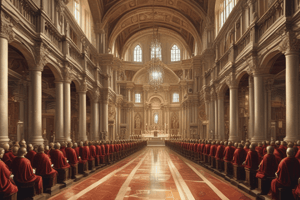Podcast
Questions and Answers
Which of the following events is associated with the formal resolution of the doctrinal disputes within early Christianity?
Which of the following events is associated with the formal resolution of the doctrinal disputes within early Christianity?
- The Edict of Milan
- The Reformation
- The Council of Nicaea (correct)
- The Schism
The Schism refers to the split between the Catholic and Protestant branches of Christianity.
The Schism refers to the split between the Catholic and Protestant branches of Christianity.
False (B)
Name one significant figure in the development of the Australian Catholic Church.
Name one significant figure in the development of the Australian Catholic Church.
Saint Mary MacKillop
The ___________ was a significant event that promoted ecumenism and modernized the Catholic Church's practices.
The ___________ was a significant event that promoted ecumenism and modernized the Catholic Church's practices.
Match the following figures with their contributions to the Australian Catholic Church:
Match the following figures with their contributions to the Australian Catholic Church:
Flashcards are hidden until you start studying
Study Notes
The Early Christian Church
- The Council of Nicaea (325 CE) was convened by the Roman Emperor Constantine. The Council addressed the controversial issue of the nature of Christ, specifically his divinity.
- The Council of Jerusalem (49 CE) was convened by the Apostles to discuss the role of Gentile Christians within the early Church.
- The Edict of Milan (313 CE) was issued by Roman Emperors Constantine and Licinius. It declared tolerance for Christianity within the Roman Empire, effectively ending the persecution of Christians.
The Development of the Christian Church
- The Great Schism (1054 CE) marked the formal separation between the Eastern Orthodox Church and the Roman Catholic Church. The Schism was caused by a combination of theological disagreements, political tensions and cultural differences.
- The Protestant Reformation (16th century) was a religious movement that challenged the authority of the Roman Catholic Church. Led by figures like Martin Luther, the Reformation emphasized scripture, individual faith and the priesthood of all believers.
- Catholic, Orthodox, and Protestant churches are the three main branches of Christianity. They demonstrate distinct differences in beliefs, practices, and interpretations of scripture, but share common core principles such as faith in Jesus Christ, the Bible and the importance of prayer.
The Development of the Australian Catholic Church
- Father John Therry played a significant role in the early development of the Catholic Church in Australia during the early 19th century. He was responsible for establishing schools and orphanages
- Father James Dixon was a prominent figure in the Australian Catholic Church. He advocated for the rights of Aboriginal Australians and worked to improve their living conditions.
- Archbishop Bede Polding was the first Catholic Archbishop of Sydney. His leadership led to the establishment of the Catholic Church as a major institution in Australian society.
- Archbishop Daniel Mannix was a controversial yet influential figure in the Australian Catholic Church during the 20th century. He was known for his strong commitment to social justice and his criticism of government policies.
- Saint Mary MacKillop was a pioneering Australian Catholic educator who dedicated her life to setting up schools for disadvantaged children. She founded the Sisters of St Joseph and was canonized as a Catholic saint in 2010.
- Caroline Chisolm (although not a Catholic) made significant contributions to assisting migrants in Australia, especially women and children. She advocated for their welfare and played a role in the development of social services.
The Church Today
- The Second Vatican Council (1962–1965) was a series of meetings convened by the Catholic Church to address the Church's role in the modern world. It emphasized the importance of dialogue, ecumenism and the need for the Church to be more engaged with contemporary issues.
- Ecumenism refers to efforts to promote unity among Christian denominations. The movement aims to bridge theological divides, foster dialogue and ultimately reconcile differing branches of Christianity.
- Interfaith Dialogue describes communication and understanding between different religious faiths. This involves open and respectful exchange of ideas, beliefs and practices to foster mutual respect and tolerance.
- Challenges of the Australian Church today include issues such as secularism, declining church attendance, youth disengagement and societal changes that have influenced traditional beliefs and practices.
Luke’s Gospel
- Jesus' interacting with His Disciples is a dominant theme in Luke's Gospel. Luke highlights the importance of Jesus' teachings and his relationship with his disciples, presenting them not only as learners, but as individuals who play a key role in the spreading of Jesus' message.
Studying That Suits You
Use AI to generate personalized quizzes and flashcards to suit your learning preferences.




